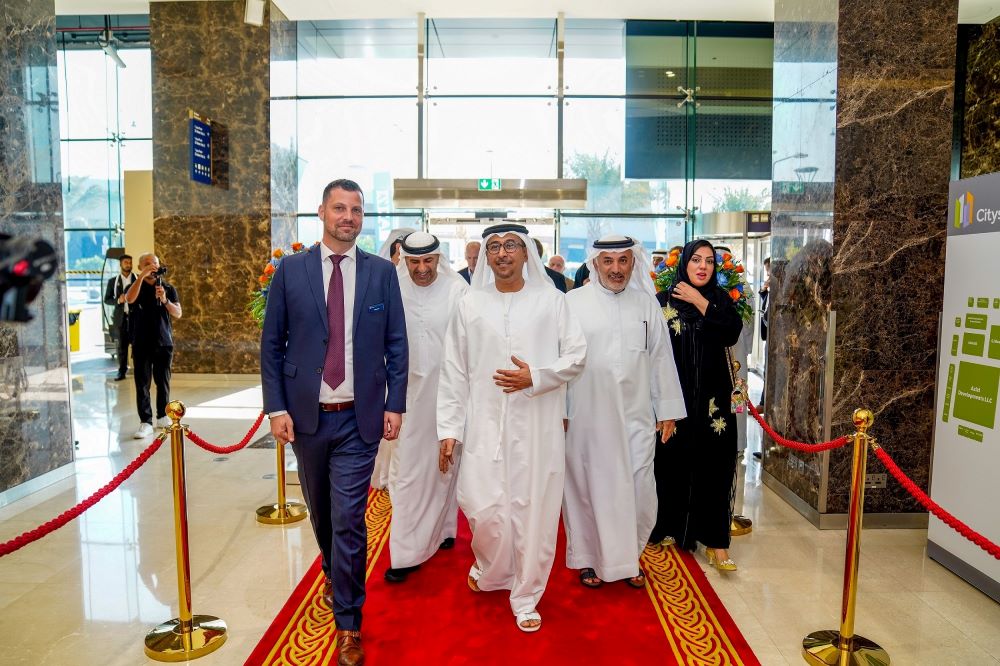The 22nd edition of Cityscape Dubai, the Middle East’s leading real estate exhibition, was officially opened today by His Excellency Dawoud Abdul Rahman Al Hajri, Director General of Dubai Municipality.
Touring the exhibition, which runs at Dubai World Trade Centre until November 23, Al Hajri was briefed on numerous new-to-market projects from top development enterprises, including Sobha Realty, Dubai Investments, ARADA, DAMAC, and Azizi Developments.
Sobha Realty is showcasing its latest master-planned urban design community, Sobha Hartland Two, which leverages technology for heightened efficiency, sustainability, and liveability. “It’s not just important to deliver high-quality buildings, but also to create family communities. Sobha Hartland Two has dedicated more than 50 per cent of the land to family living, which will include schools, parks, and community spaces,” said Francis Alfred, Managing Director of Sobha Realty.
Azizi Developments is also showcasing a number of its developments, including Riviera, the developer’s French Mediterranean-inspired residential and commercial community in MBR City, and Creek Views II, located in Dubai Healthcare City, the emirate’s health and wellness destination that enjoys direct access to Al Khail Road.
“We look forward to Cityscape each year,” said Farhad Azizi, CEO of Azizi Developments. “We see it as an important opportunity to not only showcase our portfolio and investment opportunities, but to also educate visitors on the UAE’s thriving real estate market, with it being a world-leading hub for business, tourism, and innovation. Representing a major source of foreign direct investment, Cityscape has established itself as a renowned, widely leveraged platform that provides local and international investors with in-depth insights into the UAE’s real estate sector, its outstanding macroeconomic fundamentals and how competitive it is in comparison to other markets.”
Sharjah-based developer, Arada, has unveiled its first project in Dubai with the launch of Jouri Hills at Jumeirah Golf Estates (JGE). The latest phase in the 40 million square-foot JGE masterplan, Jouri Hills contains 294 high-end homes located close to two world-class golf courses. Announced during the first day of Cityscape Dubai, the launch signals Arada’s first foray outside the Sharjah real estate market, where it is the emirate’s largest master developer with projects valued at more than Dh33 billion and with property sold valued at Dh8.6 billion.
Cityscape Talks dives into sustainability, Expo City Dubai’s future and how technology and efficiency are impacting the sector
The 2022 edition of Cityscape Talks, the region’s leading content platform powered by Cityscape Intelligence, kicked off with a fireside discussion with Ahmed Al Khatib, Chief Development and Delivery Officer at Expo City Dubai. Discussing both the rebrand and the next steps for the development, Al Khatib identified sustainability as a key driver of the site, which was rebranded to Expo City Dubai earlier this year.
“What we achieved was a first for the region and I believe is something that can be used as a blueprint for future projects. Throughout, we were both active and transparent on how we aimed to deliver on our sustainability promises, with regular reports being released on how we integrated sustainability into Expo City Dubai’s development. Technology and data also played a huge part in the development, with data analysis of previous projects helping us identify how to deliver the 42 individual projects that make up Expo City Dubai,” said Al Khatib.
“The reason we decided to rebrand to Expo City Dubai is twofold. The connection to EXPO became so synonymous with the values of the site, and I also don’t believe there is anywhere else as human-centric as Expo City Dubai. From landscaping to technology, the way it has been developed gives us the flexibility to adapt and transform to any future needs, and with the hosting of COP28 next year, this will be vital.”
Staying on sustainability, a panel discussion with Hamza Betraoui, Managing Director, Land Sterling; Mohamed Shawky, CEO, Gis Drones; and Henrique Pereira, CEO, Taka Solutions, discussed how technology is playing a crucial part in improving sustainability standards and efficiency within buildings. “Understanding how technology can help developments is key to the integration of sustainability,” said Betraoui. “When you look at the last three years, how technology has developed and how people are learning to use big data to understand what needs to be done to increase green efficiency has been amazing to see.”
Shawky is confident that the acceleration of drone use will streamline some processes, cutting down evaluation timeframes significantly. “Drones allow us to collect fast, high-quality data,” said Shawky. “We can use this to inspect issues with buildings in which every centimetre can be scanned and then analysed, giving you a full insight into issues within a matter of hours rather than weeks. We have drones now that can work in GPS-denied areas as well, such as tunnels or staircases. All of this technology saves time, increases safety, and is energy efficient.”
When prompted about whether there is such a thing as too much efficiency and the increasing reliance on AI, Betraoui added: “I don’t think you can have too much efficiency, but if processes are impacting either environment, people, or economy, then it isn’t efficient. Also, if we become too dependent on the reliability of AI analysis, then we are sealing our own fate. There still needs to be a human element of technological efficiency and the processes that come with it. When errors occur along the chain, then that is when automation needs that irreplaceable human touch.”

